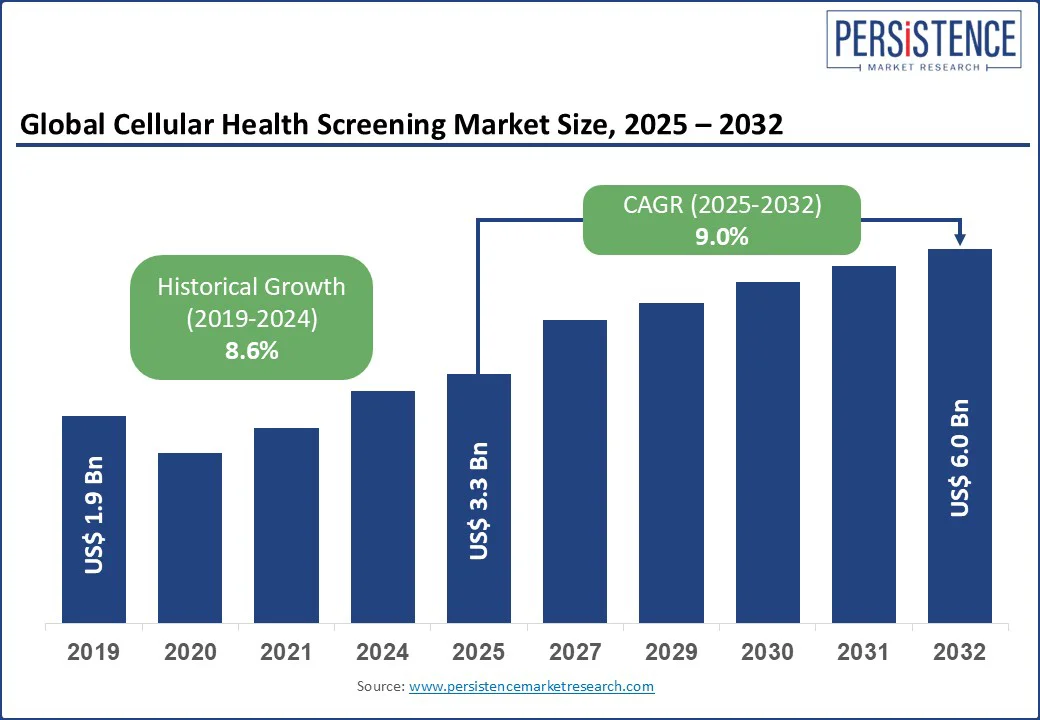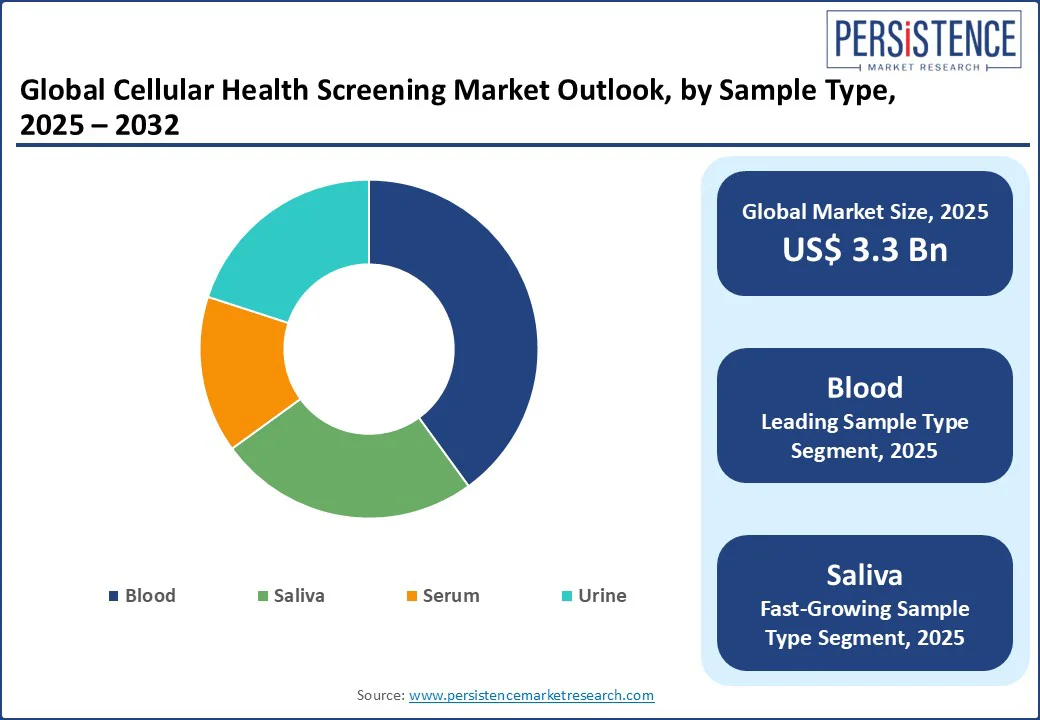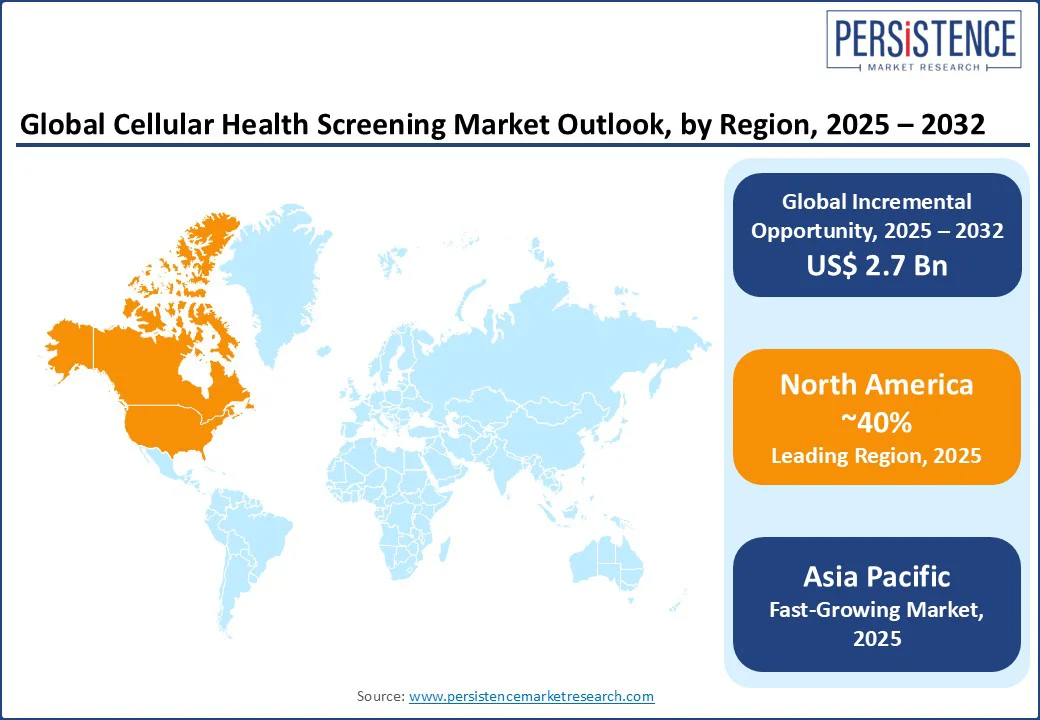ID: PMRREP31731| 185 Pages | 20 Aug 2025 | Format: PDF, Excel, PPT* | Healthcare

The global cellular health screening market size is likely to be valued at US$ 3.3 Bn in 2025 and is expected to grow to US$ 6.0 Bn by 2032, growing at a CAGR of 9.0% during the forecast period 2025 - 2032.
The cellular health screening market is growing steadily, driven by increasing demand for preventive healthcare and personalized medicine. Rising awareness of early disease detection, anti-aging solutions, and wellness monitoring is fueling adoption.
Advanced technologies such as biomarker analysis, telomere testing, and oxidative stress assessment are enhancing accuracy and accessibility. The market is expanding across diagnostic centers, hospitals, and home testing kits, with strong growth in developed and emerging economies.
Key Industry Highlights:

|
Key Insights |
Details |
|
Cellular Health Screening Market Size (2025E) |
US$3.3 Bn |
|
Market Value Forecast (2032F) |
US$6.0 Bn |
|
Projected Growth (CAGR 2025 to 2032) |
9.0% |
|
Historical Market Growth (CAGR 2019 to 2024) |
8.6% |
The cellular health screening market is propelled by several key factors, with a significant focus on growing awareness of preventive healthcare and aging populations, driving demand for wellness testing and cellular health analysis for early disease detection. The global preventive healthcare market grew by 12% in 2025, increasing demand for biomarker testing, antioxidant level testing, and inflammation marker tests to detect chronic diseases early.
A 2025 survey noted that 65% of consumers aged 40+ seek health optimization tests to monitor cellular health, boosting micronutrient deficiency screening by 15%. The global aging population, expected to reach 2.1 Bn by 2050, fuels demand for anti-aging testing and telomere and oxidative damage tests, with 20% growth in functional medicine diagnostics in 2025.
Cellular function analysis and intracellular health screening are critical for detecting oxidative stress and nutrient deficiencies, with 70% of diagnostic labs adopting multi-test panels in 2025. The cost of cellular health screening services, reduced by 10% through cellular health kits for home use, enhances accessibility, particularly in developed markets, supporting laboratory-based cellular health analysis and the best cellular health screening companies.
High costs and limited insurance coverage pose significant restraints to the cellular health screening market, impacting cell testing and biomarker testing adoption. The cost of cellular health screening services for multi-test panels ranges from US$200 to US$500 per test, deterring 40% of consumers in emerging markets. Limited insurance coverage, with only 30% of U.S. health plans covering functional medicine diagnostics in 2025, restricts accessibility for wellness testing.
Regulatory complexities, such as FDA and EU approvals for laboratory-based cellular health analysis, increase compliance costs by 15%. Supply chain challenges for cellular health kits for home use, with 10% cost increases in reagents in 2025, further limit the scalability of micronutrient deficiency screening and telomere and oxidative damage tests in price-sensitive regions such as Africa and parts of the Asia Pacific.
The rise of cellular health kits for home use and advancements in personalized medicine present significant opportunities. The global at-home diagnostics market is projected to grow at a leading CAGR through 2032, driven by increasing demand for home collection sites and cellular biomarker analysis.
A 2025 report noted that 25% of new health tests are at-home kits, boosting cellular health kits for home use by 18%. Anti-aging testing and health optimization tests, driven by telomere and oxidative damage tests, grew by 15%, with companies such as Quest Diagnostics Incorporated integrating AI-driven analytics for personalized results.
Emerging markets, with 1.5 Bn health-conscious consumers by 2030, offer opportunities for cellular function analysis in inflammation marker tests. Best cellular health screening companies, such as Life Length, are investing US$200 Mn in R&D for functional medicine diagnostics, targeting cellular health analysis for early disease detection, positioning intracellular health screening as a key growth driver.
Multi-Test Panels hold approximately 55% of the market share in 2025 due to their comprehensive approach in cellular biomarker analysis and health optimization tests, with 60% adoption in diagnostic labs. These panels provide an in-depth view of cellular function, oxidative stress, inflammation levels, and nutrient deficiencies, making them highly valuable for health optimization and early disease detection.
Multi-Test Panels are also driven by functional medicine diagnostics and micronutrient deficiency screening, with 15% growth in 2025. These panels help clinicians identify underlying imbalances and develop targeted interventions for chronic disease prevention, anti-aging, and wellness management.
Blood commands a 50% market share in 2025, driven by antioxidant level testing and inflammation marker tests, with 65% adoption in laboratory-based cellular health analysis. Blood tests provide a comprehensive view of cellular health and are widely used in diagnostic laboratories, hospitals, and wellness clinics for early detection of chronic conditions and preventive care.
Cellular health kits for home use and telomere and oxidative damage tests fuel saliva. The saliva testing segment is expected to grow by 18% in 2025, fueled by the rising adoption of direct-to-consumer health tests, personalized wellness programs, and remote diagnostic solutions.
Diagnostic Labs hold a 40% market share in 2025, driven by laboratory-based cellular health analysis and cellular function analysis, with 55% adoption in 2025. These labs provide advanced testing capabilities, allowing for precise measurement of biomarkers such as oxidative stress indicators, telomere length, and micronutrient deficiencies.
Home is fueled by cellular health kits for home use and wellness testing, with 20% growth in 2025. These kits allow consumers to conveniently assess biomarkers such as oxidative damage and nutritional balance from the comfort of their homes, often with the support of digital platforms and telehealth consultations.

In North America, the cellular health screening market holds a prominent position, commanding a 40% market share in 2025. The U.S. dominates due to its advanced healthcare infrastructure and high adoption of wellness testing. The U.S. market grows, driven by cellular health analysis for early disease detection and anti-aging testing, with 70% of health-conscious consumers using micronutrient deficiency screening in 2025.
Cellular health kits for home use grew by 15%, supported by Quest Diagnostics Incorporated and LabCorp. Telomere and oxidative damage tests see 12% growth, aligning with functional medicine diagnostics trends. Life Length and SpectraCell Laboratories, Inc. drive 25% of regional revenue, leveraging best cellular health screening companies.
In Europe, the cellular health screening market accounts for a 30% market share, led by Germany, the UK, and France. Germany’s market is driven by biomarker testing and inflammation marker tests, with 60% of diagnostic labs adopting multi-test panels in 2025. The UK’s health optimization tests support with anti-aging testing by NHS clinics.
France’s cellular function analysis drives 12% growth in micronutrient deficiency screening. EU regulations promoting personalized medicine boost 15% growth in telomere and oxidative damage tests, with €150 Mn in funding for health diagnostics in 2025, enhancing functional medicine diagnostics. Genova Diagnostics leads with 10% market share.
Asia Pacific is the most prominently growing region, with a CAGR of 10.0%, led by China, India, and Japan. China holds a 40% regional market share, driven by a 25% increase in preventive healthcare adoption in 2025, boosting cellular health kits for home use and biomarker testing. Japan’s market is fueled by anti-aging testing and cellular biomarker analysis, with 20% growth in wellness testing.
India’s market expansion is driven by micronutrient deficiency screening and cellular health analysis for early disease detection, with 90% of urban clinics adopting multi-test panels in 2025. Cellular health kits for home use and laboratory-based cellular health analysis, supported by US$ 20 Bn in healthcare investments by 2030, drive innovation.

The global cellular health screening market is highly competitive, with diagnostics companies competing on innovation, accuracy, and accessibility. Life Length and SpectraCell Laboratories, Inc. dominate in telomere and oxidative damage tests, while Quest Diagnostics Incorporated leads in laboratory-based cellular health analysis. Cellular biomarker analysis, functional medicine diagnostics, and cellular health kits for home use add a competitive layer. Strategic partnerships and R&D investments in health optimization tests are key differentiators.
The cellular health screening market is projected to reach US$ 3.3 Bn in 2025, driven by cellular health kits for home use and biomarker testing.
Preventive healthcare, cellular health analysis for early disease detection, and anti-aging testing are key drivers.
The cellular health screening market grows at a CAGR of 9.0% from 2025 to 2032, reaching US$ 6.0 Bn by 2032.
Opportunities include cellular health kits for home use, functional medicine diagnostics, and telomere and oxidative damage tests.
Key players include Life Length, SpectraCell Laboratories, Inc., Quest Diagnostics Incorporated, Genova Diagnostics, and DNA Labs India.
|
Report Attribute |
Details |
|
Historical Data/Actuals |
2019 - 2024 |
|
Forecast Period |
2025 - 2032 |
|
Units |
Value: US$ Bn, Volume: As Applicable |
|
Geographical Coverage |
|
|
Segmental Coverage |
|
|
Competitive Analysis |
|
|
Report Highlights |
|
|
Customization and Pricing |
Available upon request |
By Test Type
By Sample Type
By Collection Site
By Region
Delivery Timelines
For more information on this report and its delivery timelines please get in touch with our sales team.
About Author